Sleep disturbances during menopause can significantly impact a woman’s overall health and quality of life. Associations have been observed between sleep problems and specific menopausal symptoms, particularly hot flashes, mood changes, and trouble falling asleep.
These issues often escalate during perimenopause, the period leading up to menopause when ovarian function begins to decline. As women transition through this phase, understanding the complex interplay between hormonal fluctuations and sleep quality is crucial for mitigating the adverse effects on their well-being.
Key Takeaways
- Sleep disturbances affect a significant portion of menopausal women, impacting their overall health.
- Hormonal changes during menopause directly influence sleep architecture and quality.
- Common sleep issues include insomnia, sleep-disordered breathing, and disruptions due to hot flashes and night sweats.
- Lifestyle modifications and environmental adjustments can help alleviate sleep problems.
- Medical interventions and natural remedies offer additional solutions for managing sleep disturbances.
The Menopause-Sleep Connection: Understanding the Basics
Understanding the intricate relationship between menopause and sleep is crucial for addressing the sleep disturbances that many women experience during this phase. Menopause is characterized by a decline in hormone production, particularly estrogen, progesterone, and testosterone, which regulate not only reproductive functions but also impact sleep quality.
How Hormonal Changes Affect Sleep Quality
The hormonal fluctuations during menopause directly impact sleep architecture and quality. As estrogen levels decline, the body’s ability to regulate sleep-regulating neurochemicals like serotonin and melatonin is affected, leading to disrupted sleep patterns. Furthermore, the decrease in progesterone, which has natural sedative properties, contributes to sleep difficulties.
The Role of Estrogen in Sleep Regulation
Estrogen plays a significant role in promoting healthy sleep. It helps the body utilize serotonin and other neurochemicals that assist in falling asleep and maintaining sleep throughout the night. As estrogen levels decrease during menopause, women may experience poorer sleep quality, characterized by frequent awakenings and longer times to fall asleep. Understanding the role of estrogen in sleep regulation is key to addressing sleep problems during the menopausal transition.
Common Sleep Disorders During Menopause
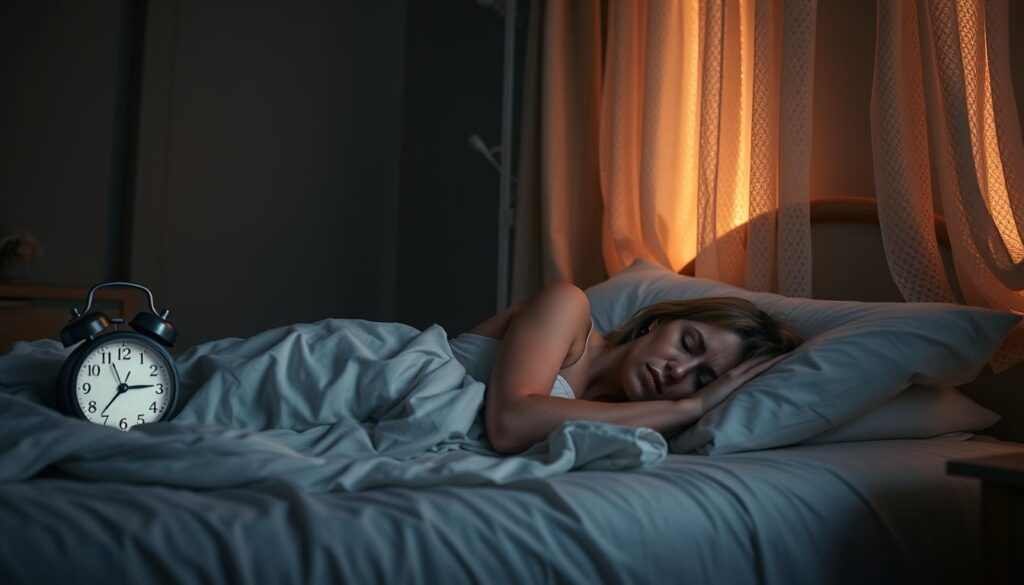
The onset of menopause is associated with an increased risk of developing various sleep disorders. During this transitional period, women often experience a range of sleep-related issues that can significantly impact their quality of life. Sleep disorders such as insomnia, sleep apnea, and restless leg syndrome are common complaints among menopausal women.
Insomnia: The Most Prevalent Sleep Issue
Insomnia is a prevalent sleep disorder during menopause, affecting up to 60% of women. It manifests as difficulty falling asleep, staying asleep, or experiencing early morning awakening. Menopausal women often report insomnia due to hormonal changes, hot flashes, and other menopause-related symptoms.
Sleep Apnea: An Underdiagnosed Problem
Postmenopausal women are two to three times more likely to develop sleep apnea compared to premenopausal women. Sleep apnea is often underdiagnosed in women due to subtle symptoms, which can lead to delayed diagnosis and treatment. Healthcare providers should be aware of this increased risk to provide timely interventions.
Restless Leg Syndrome and Periodic Limb Movements
Restless leg syndrome and periodic limb movements are other common sleep disorders that can disrupt sleep quality during menopause. These conditions can cause uncomfortable sensations in the legs, leading to frequent awakenings and poor sleep.
“Understanding these specific sleep disorders is crucial for proper diagnosis and targeted treatment approaches rather than simply attributing all sleep problems to general menopause symptoms.”
By recognizing and addressing these sleep disorders, healthcare providers can help menopausal women achieve better sleep and improve their overall well-being.
Menopause and Sleep Problems: Causes and Solutions Explained
Sleep problems during menopause are a complex issue, influenced by a combination of hormonal, physical, and psychological factors. Understanding these factors is crucial for developing effective solutions.
Primary Hormonal Factors
The decline in estrogen and progesterone levels during menopause directly impacts sleep architecture. This hormonal change disrupts normal sleep cycles and reduces the time spent in restorative deep sleep. According to the SWAN study, sleep quality and quantity decline in women beginning in peri-menopause and continue as they transition into menopause.
Secondary Symptoms Affecting Sleep
Secondary symptoms such as hot flashes, night sweats, mood changes, and increased anxiety play a significant role in disrupting sleep continuity and quality. These symptoms can occur at any time, including during sleep, making it difficult for women to achieve restful sleep.
The Cycle of Poor Sleep and Worsening Symptoms
There’s a bidirectional relationship between poor sleep and menopause symptoms. Disrupted sleep can worsen daytime symptoms, which in turn further impair nighttime rest. Understanding this cycle is essential for developing effective intervention strategies.
| Factors Affecting Sleep | Impact on Sleep |
|---|---|
| Hormonal Changes | Disrupts normal sleep cycles, reduces deep sleep |
| Hot Flashes and Night Sweats | Disrupts sleep continuity, reduces sleep quality |
| Mood Changes and Anxiety | Impairs sleep quality, increases sleep disturbances |
Hot Flashes and Night Sweats: The Midnight Disruptors
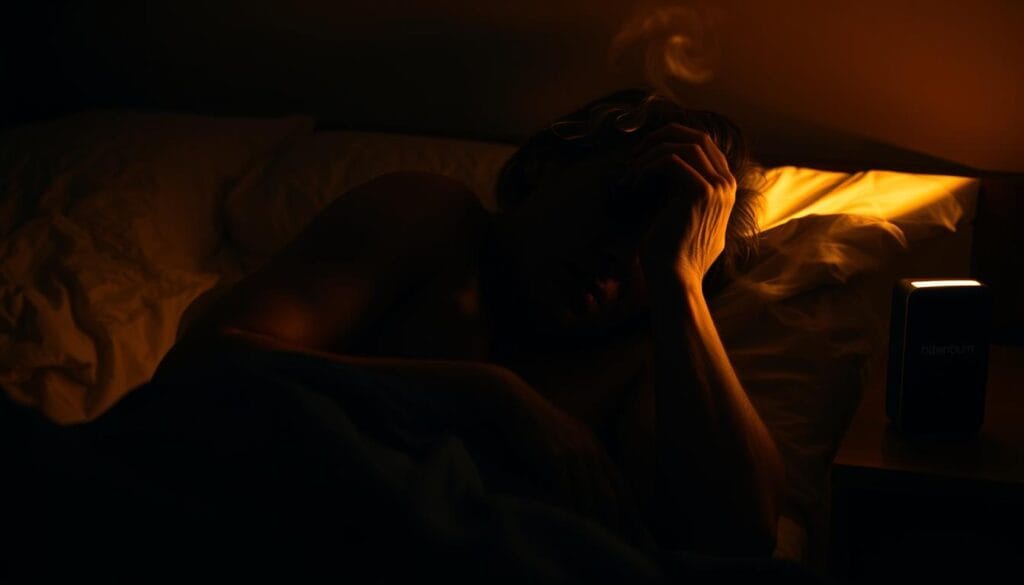
Menopausal women often face significant challenges with sleep due to hot flashes and night sweats, which can disrupt their sleep patterns and overall well-being. Sleep disturbances due to hot flashes and night sweats are a prevalent concern among menopausal women, necessitating effective management strategies. At least three out of every four menopausal women will experience hot flashes, and about 60% will report sleep disorders due to these symptoms.
Why Hot Flashes Occur During Sleep
Research indicates that many menopausal women wake up just before a hot flash occurs, suggesting that neurological changes trigger both the awakening and the subsequent hot flash. The physiological mechanisms behind nighttime hot flashes involve the brain’s thermoregulatory center and hormonal fluctuations. Understanding these mechanisms is crucial for developing targeted approaches to minimize their impact on sleep quality.
- The brain’s thermoregulatory center plays a key role in triggering hot flashes.
- Hormonal changes during menopause contribute to the occurrence of hot flashes.
- Neurological changes can awaken women before a hot flash occurs.
Managing Nighttime Temperature Fluctuations
Managing night sweats and hot flashes requires a multi-faceted approach. Practical strategies include environmental modifications, such as keeping the bedroom cool, wearing appropriate sleepwear, and utilizing cooling technologies. By understanding the timing and patterns of nighttime hot flashes, women can develop effective strategies to minimize their impact on sleep.
- Keep the bedroom cool to reduce the severity of hot flashes.
- Choose breathable sleepwear to help regulate body temperature.
- Consider using cooling technologies, such as cooling pads or fans, to manage nighttime temperature fluctuations.
Lifestyle Changes to Improve Sleep During Menopause
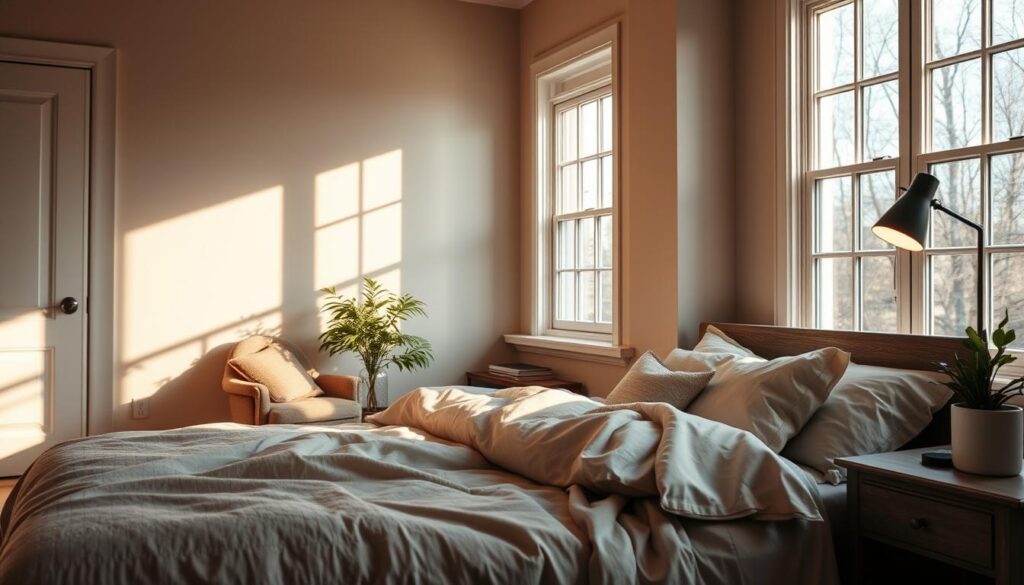
Adopting healthier lifestyle habits can significantly enhance sleep quality and duration during menopause. By making a few key changes, women can improve their overall sleep experience.
Creating an Optimal Sleep Environment
Creating a sleep-conducive environment is crucial for improving sleep quality. This includes keeping the room cool, between 60°F to 67°F (15.6 to 19.4°C), as recommended by the National Sleep Foundation. Additionally, eliminating light sources such as cell phones, alarm clocks, TVs, and lamps can help. Darkness and a cooler temperature can counteract hot flashes and night sweats, common disruptors of sleep during menopause.
Developing a Consistent Sleep Schedule
Establishing a consistent sleep schedule is vital. Going to bed and waking up at the same time every day, including weekends, helps regulate the body’s internal clock. This consistency can improve the quality of sleep and help manage menopausal symptoms.
Exercise and Its Impact on Sleep Quality
Regular physical activity, particularly 30 minutes of moderate exercise, can significantly improve sleep quality. However, it’s essential to time exercise correctly, finishing workouts at least 3-4 hours before bedtime to avoid stimulating the body before sleep.
Dietary Adjustments for Better Sleep
Dietary changes can also promote better sleep. Avoiding meals within 1 hour of bedtime, limiting caffeine and alcohol consumption, and incorporating sleep-promoting foods rich in tryptophan, magnesium, and complex carbohydrates can be beneficial. These adjustments can help improve sleep onset, duration, and quality.
| Lifestyle Change | Benefit |
|---|---|
| Cool Sleep Environment | Reduces hot flashes and night sweats |
| Consistent Sleep Schedule | Regulates body’s internal clock |
| Regular Exercise | Improves sleep quality when timed correctly |
| Dietary Adjustments | Promotes better sleep onset and duration |
Medical Treatments for Menopausal Sleep Problems
Sleep problems during menopause are common, yet there are several effective medical treatments available to manage these issues.
Medical interventions can range from hormonal treatments to non-hormonal medications and therapies. It’s essential to consult a healthcare professional to determine the best course of treatment.
Hormone Replacement Therapy Options
Hormone Replacement Therapy (HRT) is a treatment that supplements estrogen and progesterone levels, helping to manage menopause symptoms, including sleep disturbances. HRT is available in various forms, such as topical creams or gels, patches, and oral tablets.
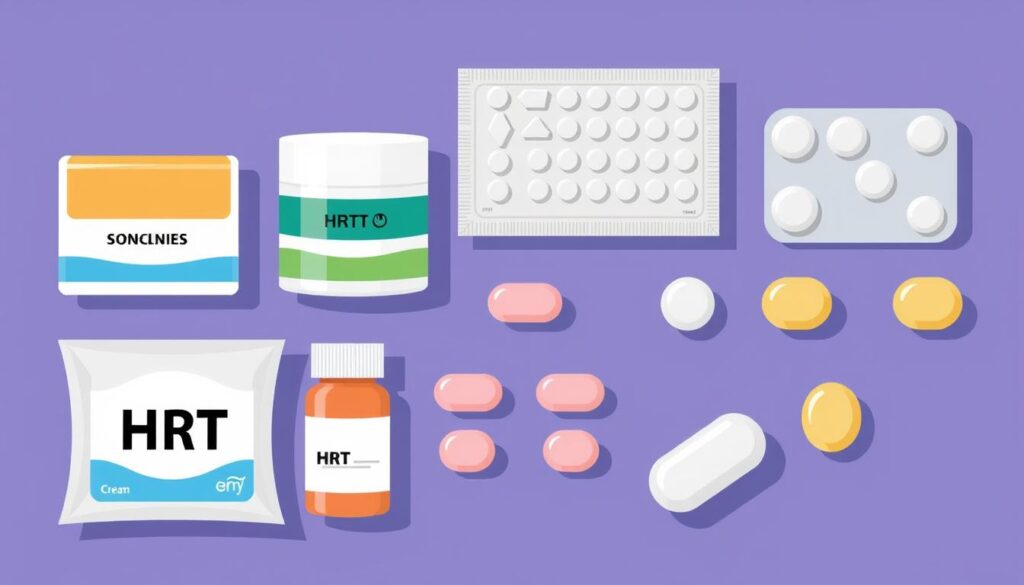
Non-Hormonal Medications for Sleep
For women who cannot or prefer not to use HRT, non-hormonal medications can be an effective alternative. These include low-dose antidepressants like SSRIs, SNRIs, and certain benzodiazepines that have sedative effects.
Cognitive Behavioral Therapy for Insomnia
Cognitive Behavioral Therapy for Insomnia (CBT-I) is a non-pharmacological approach that helps women identify and change negative sleep patterns. CBT-I includes techniques like sleep restriction, stimulus control, and cognitive restructuring.
Natural Remedies and Supplements for Better Sleep

The menopausal transition can lead to poor sleep quality, and exploring natural remedies is a viable option. During this phase, women often experience various sleep-related issues, including insomnia and disrupted sleep patterns.
Melatonin and Sleep Regulation
Melatonin is a hormone that regulates our sleep-wake cycles. Melatonin supplements may help balance its levels, improving sleep quality. Research suggests that melatonin can be effective in addressing menopausal sleep disturbances, with recommended dosages ranging from 1-3mg taken 1-2 hours before bedtime.
Herbal Supplements: Benefits and Cautions
Various herbal supplements, such as valerian root, chamomile, and ashwagandha, have been studied for their potential sleep benefits. These supplements may promote relaxation and improve sleep quality. However, it’s crucial to consult with a healthcare provider before starting any supplement regimen, as they may interact with existing medications or have underlying health conditions.
Relaxation Techniques and Mind-Body Practices
Relaxation techniques, including progressive muscle relaxation, guided imagery, and meditation, can help alleviate stress and promote better sleep. Gentle yoga practices in the evening can also be beneficial. Incorporating these practices into your daily routine may help improve sleep quality and overall well-being during menopause.
When to Seek Professional Help for Sleep Issues
If you’re experiencing trouble sleeping during menopause, it’s essential to recognize the signs that indicate the need for professional assistance.
Menopause can bring about significant changes in sleep patterns, and while some disruptions are normal, persistent sleep problems can have serious consequences on overall health and mental health. It’s crucial to identify the warning signs that indicate a more serious sleep disorder.
Warning Signs of Serious Sleep Disorders
Certain symptoms warrant immediate medical attention. These include severe insomnia lasting more than three months, symptoms of sleep apnea such as gasping or choking during sleep, and excessive daytime sleepiness. Additionally, signs of restless leg syndrome, like persistent leg discomfort or periodic limb movements, should not be ignored.
These conditions can significantly impact women’s health, affecting not only sleep quality but also cardiovascular function, metabolic health, cognitive performance, and overall wellbeing.
Finding the Right Sleep Specialist
When seeking professional help, it’s essential to find the right doctor or sleep specialist. This could be a sleep medicine physician, pulmonologist, neurologist, or behavioral sleep medicine specialist. Each of these professionals has a unique role in diagnosing and treating sleep disorders and related conditions.
To prepare for a sleep consultation, keep a sleep diary to track your sleep habits, document your symptoms, and understand what to expect during sleep testing procedures like polysomnography. By taking these steps, you can ensure that you receive comprehensive care for your sleep issues.
Conclusion: Reclaiming Restful Sleep During Menopause
Sleep disturbances during menopause are common, but they don’t have to be a norm that women simply endure. By understanding the causes and implementing a combination of lifestyle changes, environmental adjustments, and medical interventions as needed, women can significantly improve their sleep quality. The SWAN study highlights that sleep quality and quantity decline in women transitioning into menopause, emphasizing the importance of addressing sleep issues early on to support overall women’s health.
Prioritizing good sleep hygiene and seeking guidance from qualified sleep professionals when needed can help women navigate this phase with improved sleep and overall well-being. Most women’s sleep problems stabilize or improve post-menopause, offering hope that the transition period’s sleep disruptions are often temporary. By taking proactive steps, women can sleep better and enhance their overall health.

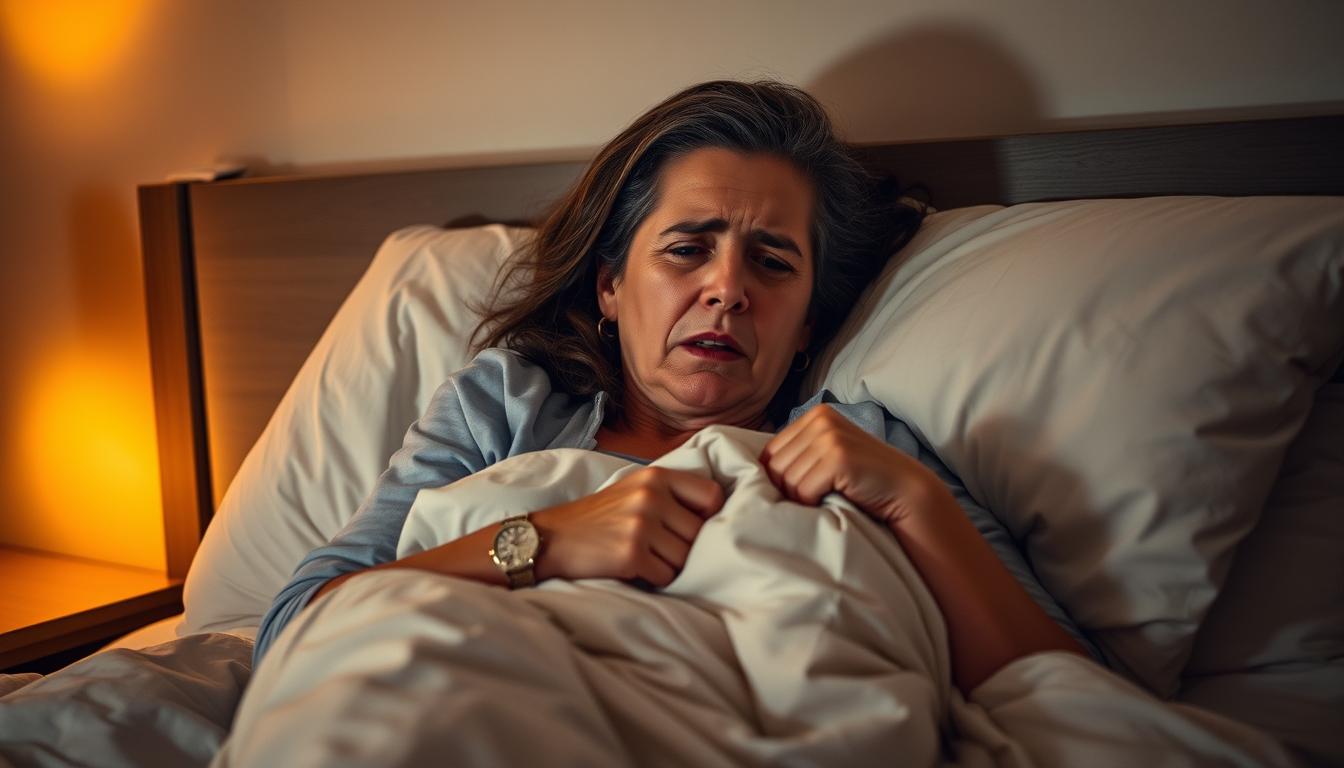
[…] Understanding the menopause transition is crucial for women to navigate this significant life change. Menopause is not just a single event but a process that involves several stages, each with its unique characteristics and challenges. […]